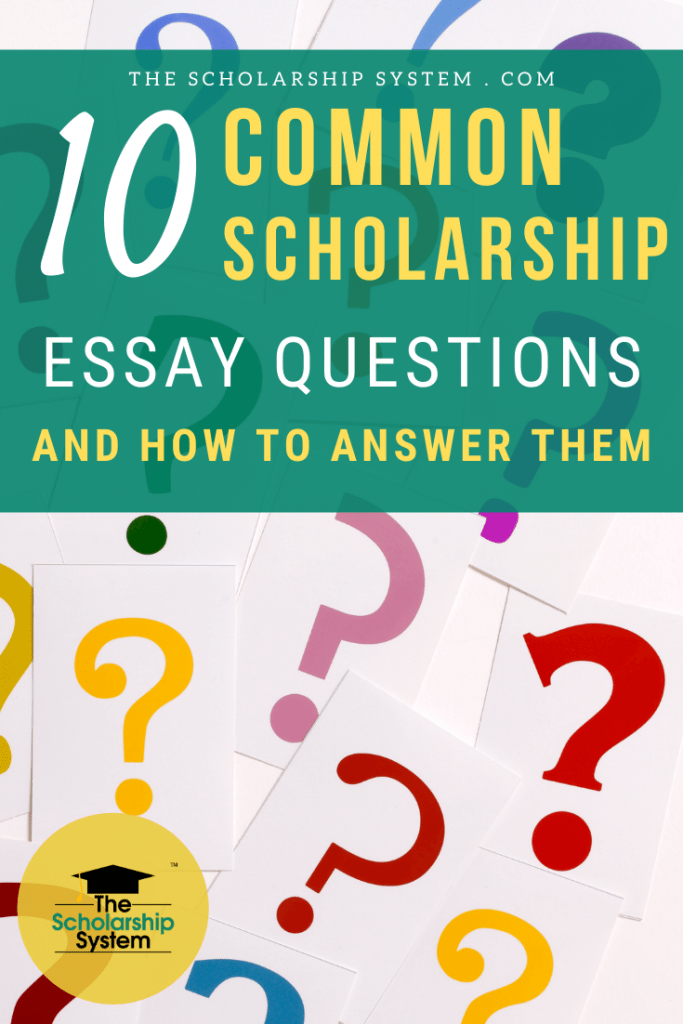Updated on October 2nd, 2024
When your student applies for scholarships, writing the essay often feels like the most challenging part. Luckily, it doesn’t have to be. By learning about common scholarship essay questions and how to answer them, your student can be prepared for most of the topics they’ll need to address.
While it’s true that different scholarships may use unique questions, many of them touch on the same ideas. That’s why exploring common scholarship essay prompts is such a smart move. Your student will have a chance to brainstorm answers in advance, making it easier to complete the applications when the time arises.
Knowing how to answer common scholarship essay questions is only part of the battle. You also have to track down great scholarships to pay for college. If you and your student want to learn more about exciting scholarship opportunities, sign up for our free college scholarship webinar! Just head to http://thescholarshipsystem.com/freewebinar and reserve your spot today.
If your student wants to get ahead of the curve and write winning scholarship essays, here’s a look at ten common scholarship essay questions and how to tackle them.
Contents
- 1 10 Common Scholarship Essay Questions and How to Answer Them
- 1.1 1. Tell Us About Yourself
- 1.2 2. How Will This Scholarship Make a Difference for You?
- 1.3 3. Can You Tell Us About a Time You Failed? What Did You Learn from That Experience?
- 1.4 4. Tell Us About a Contribution You’ve Made to Your Community
- 1.5 5. What Are Your Academic (or Professional) Goals?
- 1.6 6. Tell Us About a Time Where You Stepped Up as a Leader
- 1.7 7. Who Has Been Your Biggest Influence (or Inspiration)?
- 1.8 8. Why Do You Want to Go to College?
- 1.9 9. How Are You Planning on Financing Your College Education?
- 1.10 10. Why Do You Deserve This Scholarship?
- 1.11 11. How Have You Developed and Grown as a Person?
- 2 Using Common Scholarship Essay Questions to Prepare
Understanding Common Scholarship Essay Prompts
Scholarship essay prompts are a crucial part of the scholarship application process. They are designed to help scholarship committees assess a student’s writing skills, creativity, and fit for the scholarship. Understanding the prompts is essential to writing an effective scholarship essay. Here are some key things to keep in mind:
- Read the prompt carefully: Take the time to read and understand the prompt before starting to write your essay. Misinterpreting the prompt can lead to an off-topic essay, which can hurt your chances of winning the scholarship.
- Identify the key themes: Look for the key themes and ideas that the prompt is asking you to address. This will help you stay focused and ensure that your essay is relevant to the prompt.
- Use specific examples: Use specific examples and anecdotes to support your arguments and ideas. This makes your essay more engaging and helps the scholarship committee see your unique perspective.
- Show, don’t tell: Instead of simply stating your qualifications and achievements, use specific examples to demonstrate them. This approach makes your essay more compelling and memorable.
- Be concise: Keep your essay concise and to the point, avoiding unnecessary words and phrases. Scholarship committees often have to read many essays, so a clear and concise essay is more likely to stand out.
By understanding the scholarship essay prompts and using these tips, you can increase your chances of writing an effective scholarship essay and securing the funding you need to pursue your academic goals.
10 Common Scholarship Essay Questions and How to Answer Them
1. Tell Us About Yourself
This is possibly one of the trickiest college scholarship essays to write, not because it’s complicated, but because it’s so broad. Students have a lot of freedom with this prompt, so it’s easy to become overwhelmed about how to proceed.
Typically, students shouldn’t just give an overview of their life stories. Instead, they need to provide the committee with insights about their passions and drives, events that shaped their perspective, and relevant successes or achievements.
It’s also wise to be a bit future-focused, discussing not just where they’ve been but where they hope to go. Students can touch on valuable personality traits along the way, too, as that helps the reader gauge who they are as a person.
2. How Will This Scholarship Make a Difference for You?
Generally, students have a few options for addressing this question. First, they could showcase how the scholarship money helps them overcome a relevant financial hardship. This can include being able to afford tuition, get needed equipment or supplies, or access a program at a college that may otherwise be out of reach.
Second, they could concentrate on how the scholarship will help them achieve their academic and professional goals. For example, your student might want to discuss how the award would allow them to pursue their preferred field.
Students should focus on how the scholarship eliminates roadblocks, though the exact type of obstacle can vary. Additionally, they should discuss what they’ll be able to achieve if they receive the award, both in the short- and long-term.
3. Can You Tell Us About a Time You Failed? What Did You Learn from That Experience?
For many students, even figuring out how to start a scholarship essay introduction for this topic is hard, let alone writing the whole thing. It’s difficult discussing a failure with others, so many students hold back if they are given this prompt.
However, honesty is the best policy. Additionally, even when talking about a failure, it’s possible to keep the essay positive.
Students should start by outlining the scenario and giving an overview of how the failure occurred. The misstep can be academic, personal, or professional, as long as it’s clear that something went wrong along the way.
After the overview, it’s all about a quick pivot. Students should explain the lessons they learned and what they would do differently if faced with a similar situation again. That helps them demonstrate their self-awareness and personal growth, along with their ability to persevere.
4. Tell Us About a Contribution You’ve Made to Your Community
This scholarship essay prompt is incredibly common for volunteering scholarships or awards focused on service. Students need to share insights about their community service-oriented activities, as well as the positive impact created by their participation.
Additionally, it’s smart for students to spend some time explaining how the experience impacted them. They may also want to touch on any plans they have to continue to remain active in their community, as that can help them stand out. Involvement in community service can also contribute to the academic community by fostering leadership skills and encouraging collaboration with peers.
5. What Are Your Academic (or Professional) Goals?
With this common scholarship essay question, students need to clearly outline what they want to achieve, either academically or professionally, depending on exactly what they are asked. Usually, it’s best to start off with the basics. Students should explain what they want to study or the career path they hope to have. Scholarships can significantly help students achieve their college degree by providing financial support.
However, they shouldn’t stop there. It’s also wise to dig a bit deeper, diving into precisely what motivated them to head in this direction. Some students do this by sharing their epiphany moment, while others talk about how it’s the culmination of a life-long passion. As long as it paints a great picture, any approach is potentially a winner.
6. Tell Us About a Time Where You Stepped Up as a Leader
Leadership is a hot topic for college scholarship essays. Many committees ask questions like this one to see what applicants bring to the table. Usually, your student needs to provide a clear example of when they demonstrated leadership by taking on a leadership role.
There are a lot of options for approaching this. Heading up a school project counts, as well as captaining a sports team. Coordinating volunteer efforts may work, along with a wide variety of work-related activities.
Again, exactly what your student chooses is less important than how they describe it. It’s all about sharing a story, ensuring the reader can get a good gauge on what happened and how your student’s involvement helped them achieve success.
7. Who Has Been Your Biggest Influence (or Inspiration)?
Many scholarship essay questions want students to talk about their heroes. While it may seem odd to ask students to discuss someone other than themselves, it’s actually a great way to learn more about an applicant’s passions.
As they describe why the person influenced or inspired them, they incidentally talk about how they are motivated, their priorities, and their values. It also allows the reader to learn more about what shaped your student’s goals and aspirations, which can be quite enlightening. Receiving a scholarship award can further help students achieve these goals by providing the necessary resources and support.
Ideally, students want to be story-oriented. While they can certainly discuss the person’s traits and background, the focus should largely be on moments that inspired or influenced their way of thinking and helped them define success. That makes the essay more meaningful.
8. Why Do You Want to Go to College?
For some students, this question is surprisingly tough. Many students saw college as a must from a relatively young age, essentially viewing it as anything as optional. However, students do have choices about how they move forward after high school.
Scholarship committees want to know that heading to college isn’t an afterthought or something a student is doing solely because they were pressured in that direction. Ideally, students should discuss personal motivations or goals that made college the right choice for them. That way, their passion can shine through. Additionally, students can discuss how being part of a specific scholarship program aligns with their academic and career goals.
9. How Are You Planning on Financing Your College Education?
If a scholarship is focused on financial need, your student may face questions about how they intend to fund their education. This can be a difficult topic, particularly for students who may not be able to afford school without outside support, such as scholarships or grants. It’s hard to talk about financial hardship, but this question makes it necessary.
Students should actually start their essay by giving the committee insight into their situation, particularly regarding personal or household circumstances that make affording college difficult. After the overview, students should outline all of their efforts to secure enough funding. That can include everything from applying to scholarships, conducting a thorough scholarship search, exploring work-study, getting a part-time job, or anything else.
Often, scholarship committees appreciate it when students are taking every chance to find ways to pay for college. It lets them know that the student is passionate enough to go the extra mile and demonstrates that they aren’t afraid of challenges if it means achieving their goals. So, students should touch on everything they are doing to make their college dream possible.
10. Why Do You Deserve This Scholarship?
Writing an essay about why they deserve a scholarship can be hard for any student. However, it’s a topic they need to be ready to discuss. This is a common question for undergraduate students applying for scholarships.
Previously, The Scholarship System took a deep dive into how to write an essay on “Why I deserve this scholarship,” making that a great resource for any student who wants to prepare. As an overview, it’s about showcasing their perspective without coming across as arrogant and discussing achievements (academic or otherwise) that highlight why they are a standout applicant.
11. How Have You Developed and Grown as a Person?
Use this as an opportunity to reflect on your personal growth and development. Here are some things to keep in mind:
Be genuine and honest in your reflection, and don’t try to present a perfect picture. Scholarship committees love genuine self-reflection. Use specific examples and anecdotes to show your growth and development. This makes your essay more interesting and relatable. How have you progressed and grown over time? What have you learned from your experiences? This shows you can learn and adapt. Use a clear and concise structure to tell your story, intro, body, and conclusion. This will help make your essay easier to follow and more impactful.
Using Common Scholarship Essay Questions to Prepare
Simply knowing what the popular scholarship essay questions are usually isn’t enough. Instead, students should take extra steps to prepare to write their essays by recognizing popular scholarship essay prompts.
First, it’s wise to spend a little time brainstorming about the topics. That way, students can develop several ideas that they may want to explore and see if one approach resonates more than another.
Second, checking out some scholarship essay examples that won money is an excellent idea. This helps students learn more about what scholarship committees connect with, as well as more about how to tackle certain topics.
Finally, it’s wise to learn more about essay writing techniques. Along with reviewing how to write scholarship essays, it doesn’t hurt to research college personal statements, as those can be very similar to scholarship (and college application) essays. Similarly, checking out scholarship essay formats is a smart move. It will help your student figure out how to start a scholarship essay introduction, how to end a scholarship essay, and everything in between.
By doing that additional research, they’ll have as much information as possible. And, in the end, that could increase the odds that their essay will be a winner.









Thanks for sharing this nice piece of information i personally believe scholarships are very improtant for every student
I’m so grateful for sharing such a great information for earlier preparation of a person. Keep on doing so for the world to have a change in it.